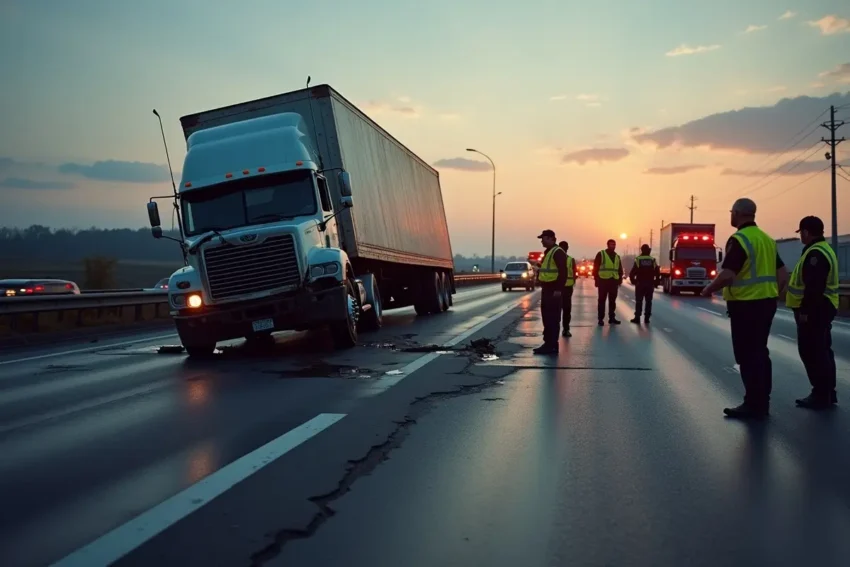Truck accidents are more complex than car collisions because the larger size and weight of trucks can lead to more severe injuries.
In 2023, about 4,354 people died in accidents involving large trucks, according to the Insurance Institute for Highway Safety. Of these, only 16% were truck occupants and 65% were car drivers and passengers. Around 17% were pedestrians, motorcyclists, and bicyclists.
Moreover, the number of commercial trucks has increased on the roads. Therefore, the number of people dying in truck accidents was 38% higher in 2023 compared to 2009.
Unlike standard car crashes, these incidents usually involve multiple parties, higher insurance stakes, and layers of state and federal regulations. As a result, identifying who is legally responsible is rarely straightforward and often requires a detailed investigation.
Without this close examination, victims may not know the full extent of who should be held accountable for their losses. In this article, we will discuss how liability is determined in commercial truck accident cases.
The Driver’s Responsibility
Because of the size and potential risks associated with their vehicles, truck drivers are held to a higher standard of care. According to the CDC, truck drivers may find it difficult to stay healthy due to irregular schedules, long hours, stress, and less physical activity.
Therefore, they are subjected to some working regulations. For example, long-haul truck drivers can only work 11 hours within a 14-hour work shift and must take a mandatory 10-hour break afterward.
A driver may be found liable for an accident if they exceed legal working hours, operate a vehicle while impaired, or disregard traffic regulations. Fatigue is a common issue for drivers because of their long shifts and tight schedules. Even small lapses in judgment can result in devastating consequences when operating a vehicle that weighs tens of thousands of pounds.
However, even if the driver is negligent, the legal system looks beyond the individual to determine whether broader systemic issues played a role. For example, suppose a driver was pressured by their employer to make unrealistic delivery times or was not properly trained. In that case, the blame may extend beyond personal misconduct.
The Trucking Company’s Role
Commercial truck drivers work for a business or a trucking company that manages them. Thus, in most commercial truck accident cases, employers are also held responsible through vicarious liability.
According to an article from Investopedia, companies may be held liable if the accident occurred while the driver was working. This principle reflects the idea that employers should also be responsible for the risks associated with their drivers’ work, since they benefit from it.
Trucking companies may also face direct liability if they neglect proper vehicle maintenance. They are also to blame if they pressure drivers to break safety rules or hire drivers without conducting adequate background checks. For instance, if a company ignored federal safety regulations or skipped regular vehicle inspections, it could be found negligent in contributing to unsafe conditions.
This is what makes contacting professional attorneys essential for victims. According to Tim Mazzela, personal injury attorney, truck accident cases are rarely centered on the driver alone. In most cases, the blame is also shared by the trucking company, cargo handler, broker, etc.
They all may be protected by insurance and, in many cases, have access to professional lawyers. Thus, it is crucial that victims also have someone whom they can rely on for legal guidance.
Contractors and Third Parties
Not all commercial trucks are operated under a single company’s direct control. Many are leased, and some involve contractors who handle maintenance, cargo loading, or other specialized tasks.
If an accident occurs due to improperly loaded cargo or faulty mechanical work, third parties may be added to the liability chain. Something as simple as cargo shifting in transit can cause a rollover or jackknife accident, creating questions about whether the loader followed proper procedures.
Consider the example of an accident involving an Amazon truck and someone working at an Amazon fulfillment center. According to a CBS News report, it was not the first time that Amazon’s contract drivers were involved in an accident. Research revealed that these contractors have higher instances of safety violations.
Showing that the driver acted carelessly may not always be sufficient. For this reason, these cases often expand into deeper investigations to pinpoint the source of negligence.
Attorneys may need to trace responsibility back through contracts, service records, and work orders to determine liability. The involvement of multiple businesses makes these cases more complicated but also ensures that liability reflects the full picture of what went wrong.
Frequently Asked Questions
How long do commercial truck accident cases typically take to resolve?
The timeline of a truck accident case is influenced by factors such as the severity of injuries and the number of parties involved. While some cases resolve within months, others that proceed to trial may take several years to conclude.
What role does insurance play in commercial truck accident cases?
Insurance is often a major factor because trucking companies usually carry high-limit policies to cover potential damages. Multiple insurance carriers may also be involved if contractors, cargo loaders, or third-party maintenance providers share liability. This can make negotiations more complex, as each insurer may try to minimize its payout.
What evidence is most valuable in proving liability in a truck accident case?
While eyewitness testimony can be helpful, the most valuable evidence often comes from technical records. This can include the truck’s electronic logging device, maintenance reports, and company communication records. These documents offer objective proof of driver fatigue, mechanical failures, or safety violations.
Liability in commercial truck accidents is rarely simple, as responsibility often extends beyond the driver to include trucking companies, contractors, and more. To get fair compensation, victims must understand the different layers of accountability in these cases. With so many moving parts, strong legal guidance ensures that no detail is overlooked and every responsible party is held accountable.

